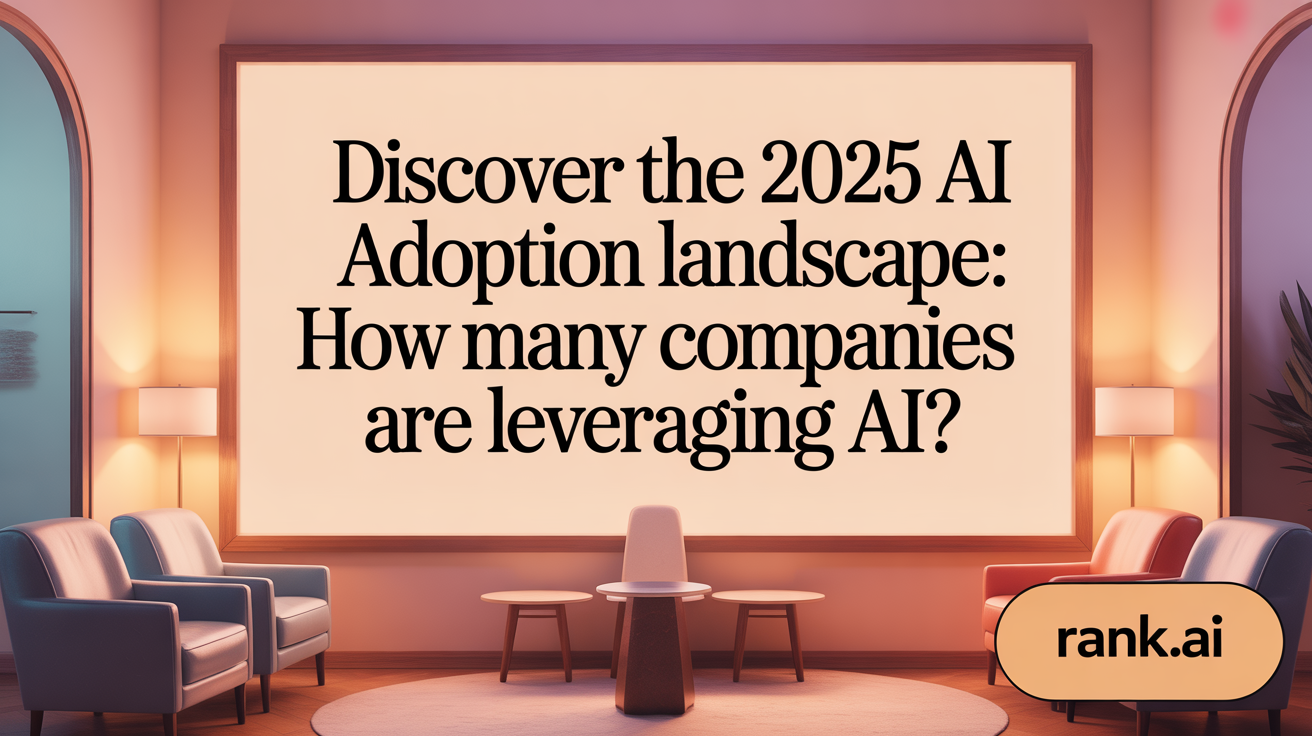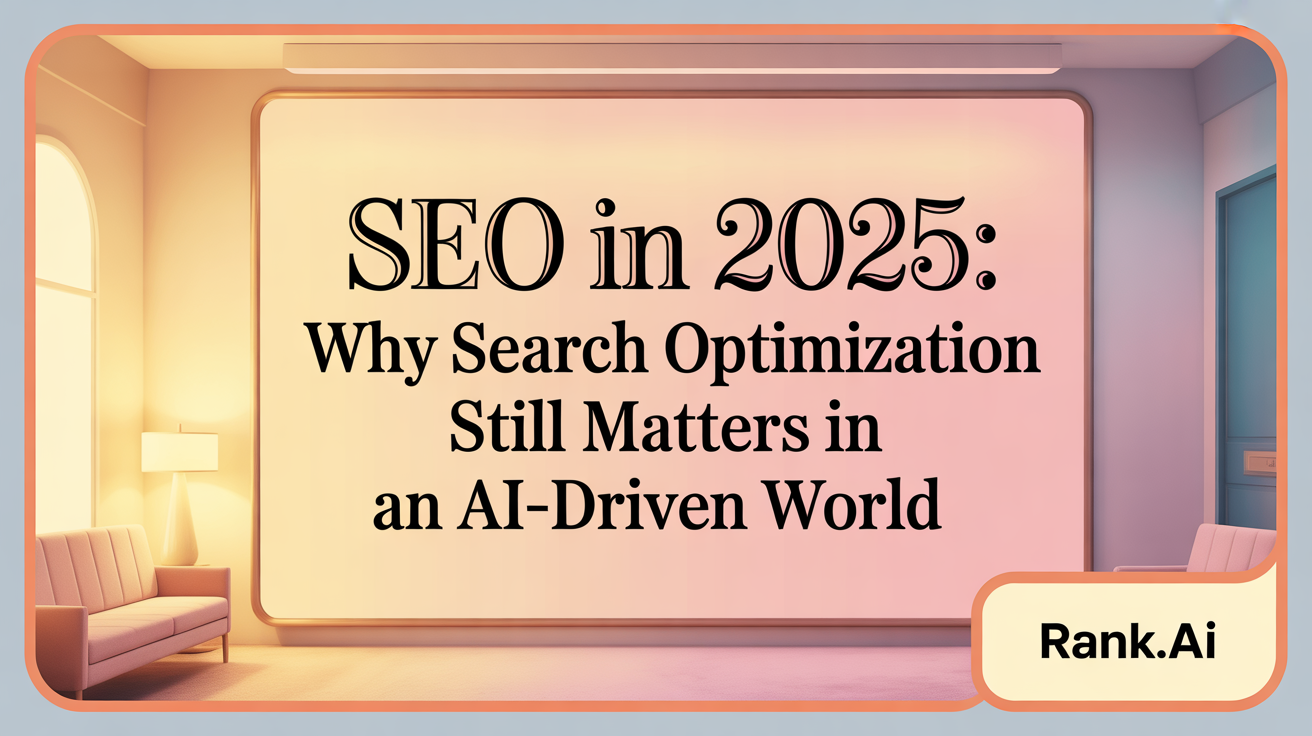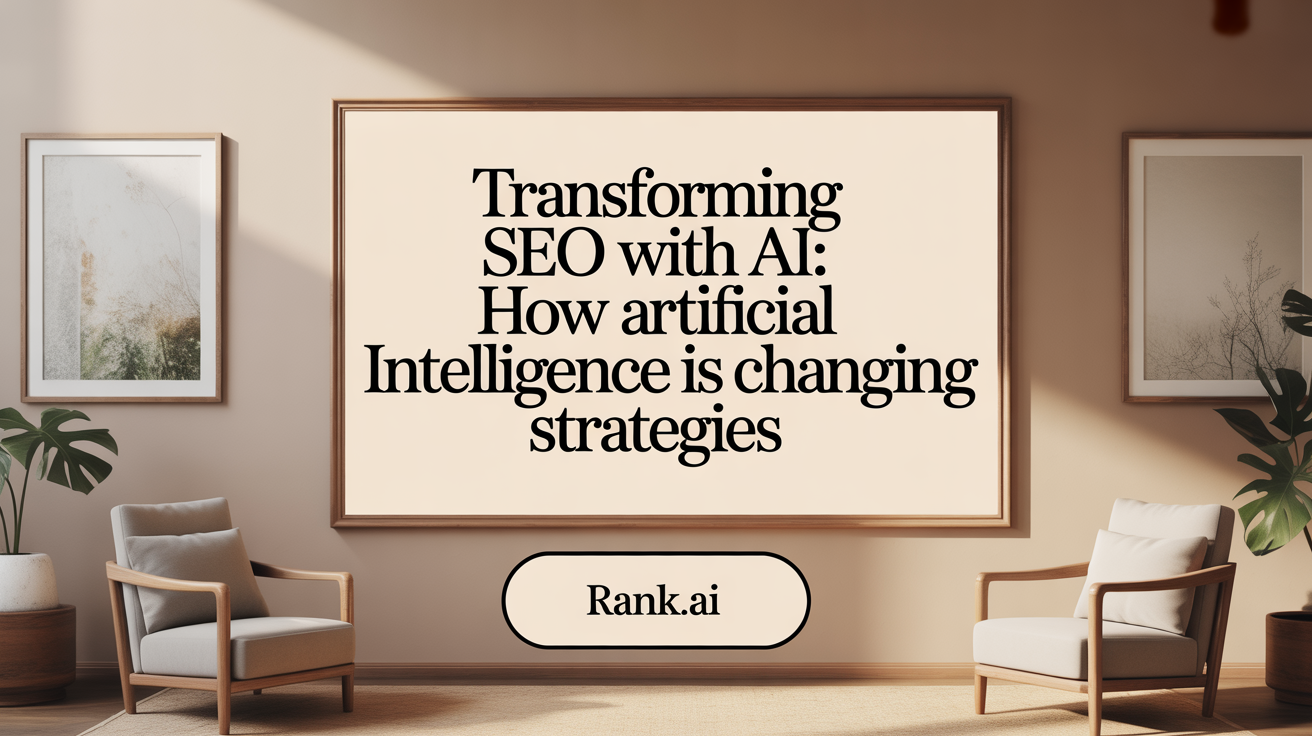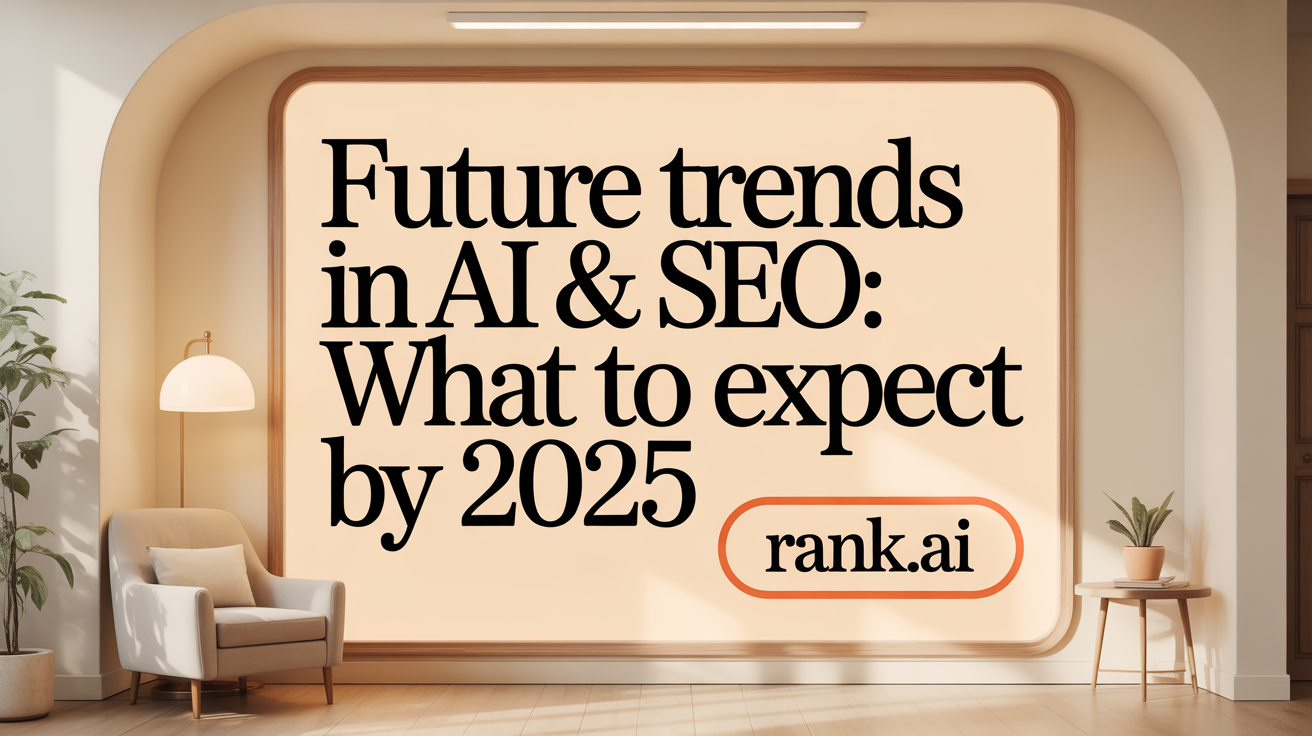What Percentage of Businesses Are Using AI for SEO in 2025?
AI Adoption in SEO: Trends and Projections for 2025

Understanding the Rising Role of AI in SEO for Businesses
As artificial intelligence revolutionizes digital marketing, the integration of AI into SEO strategies has become a key driver of competitive advantage. This article explores the projected adoption rates of AI in SEO by businesses in 2025, examines evolving SEO practices influenced by AI, and analyzes industry insights and future growth trends. Backed by extensive data and research, we unpack how AI transforms SEO workflows, impacts digital marketing outcomes, and what the future holds for businesses embracing AI technologies in SEO.
Current AI Adoption Rates Among Businesses

What is the projected percentage of companies using AI in 2025?
Industry data shows that AI adoption among companies is already widespread and continues to grow rapidly. As of 2024, about 78% of global businesses reported using AI in at least one operational area. This high level of adoption is expected to persist through 2025, with industry analysts predicting that the percentage will remain around 78%.
The strong investment trends and strategic emphasis on AI suggest that most companies recognize its value, leading to sustained or slightly increased adoption levels. Moreover, large enterprises are more likely to implement AI solutions compared to smaller firms, but the growth rate among smaller businesses is also accelerating.
In summary, with the current trajectory, approximately 78% of companies are projected to use AI by 2025, reflecting its integral role in modern business operations.
Industry-wide AI adoption rates
Across various sectors, AI is becoming an essential component of digital strategy. From customer service automation to predictive analytics, AI is transforming how companies operate. According to recent surveys, 86% of companies globally are already leveraging AI, with nearly 82% actively exploring further implementations.
Industries such as technology, retail, finance, and healthcare are leading in AI integration, driven by the potential to improve efficiency, enhance customer experience, and gain competitive advantages. Smaller industries are gradually catching up, adopting AI tools for content marketing, SEO, and data analysis.
The proliferation of AI-driven technology is also evident in the growing AI content marketing industry, which is expected to expand from $2.4 billion in 2023 to $17.6 billion by 2033 at a CAGR of around 25.68%.
Enterprise versus small business AI adoption
When comparing enterprises to small businesses, a clear disparity exists in AI adoption levels. Large companies are twice as likely to incorporate AI into their operations compared to smaller counterparts.
For example, over 86% of enterprise SEO professionals have integrated AI into their strategies, utilizing tools for keyword research, content optimization, and predictive analytics. Conversely, around 67% of small businesses have started using AI for content marketing and SEO, demonstrating significant growth but still lagging behind larger firms.
Small businesses benefit from AI by streamlining workflows, reducing manual efforts, and targeting niche markets more effectively. This trend shows that AI’s adoption is becoming more democratized, with smaller companies increasingly recognizing its importance.
Aspect Large Enterprise Companies Small Businesses Differences & Implications Adoption Percentage Over 86% About 67% Larger companies adopt AI at higher rates, but small businesses are quickly closing the gap. Main Uses SEO, customer service, predictive analytics Content marketing, SEO, automation Adoption varies based on resources, but small companies find AI accessible for growth. Impact Significant improvements in SEO, traffic, and revenue Increased efficiency and targeted marketing Both benefit, though scale differs. Future Investment High; plans to increase Growing; among early adopters Investment levels reflect strategic priorities.
This upward trend indicates that AI adoption will continue to expand across all business sizes, shaping future market dynamics and operational strategies.
More info search query
To explore further, search for "business AI adoption rates 2025" to discover recent studies, industry reports, and detailed analyses of the ongoing transformation driven by AI integration.
SEO's Continued Relevance and Evolving Role in 2025

Is SEO still in demand in 2025, and how is its role evolving?
In 2025, SEO remains a crucial element of digital marketing strategies. Despite the rapid growth of AI tools and changing search behaviors, SEO continues to deliver highly qualified traffic that can convert into sales and revenue. The global SEO market is projected to reach nearly $144 billion by 2030, reflecting ongoing investment and importance.
The way SEO is practiced has transformed significantly over recent years. Traditionally, keyword optimization was the core tactic, but now, emphasis also lies on understanding user intent and providing high-quality, authoritative content. Technical SEO elements, such as improving site speed, mobile usability, and structured data, are more important than ever.
Integrating AI has become a common practice in SEO strategies. AI-powered tools automate keyword research, content optimization, and link-building, significantly boosting efficiency and effectiveness. For instance, tools like BrightEdge’s Instant have enabled marketers to identify relevant keywords at scale, resulting in up to a 45% increase in organic traffic.
Modern SEO strategies are multi-channel and user-focused. Content is tailored across platforms like social media, video, voice search, and visual search, ensuring a seamless user experience. Voice searches account for about 20% of global queries, requiring language optimization and conversational keywords.
Content quality and user engagement signals, such as dwell time and click-through rates, are now central to ranking algorithms. AI monitors user behaviors in real time, allowing search engines to prioritize content that resonates well with users.
Overall, despite evolving technologies, the core purpose of SEO—to improve visibility and meet user needs—remains unchanged. Marketers who adapt by leveraging AI, diversifying channels, and focusing on user intent will continue to see SEO deliver valuable results in 2025 and beyond.
Transformative Impact of AI on SEO Practices

How is AI changing SEO practices in 2025?
In 2025, artificial intelligence is fundamentally transforming SEO strategies by making content optimization faster, smarter, and more aligned with user needs. Advanced machine learning models and natural language processing (NLP) tools enable marketers to perform detailed keyword research, technical site audits, and trend analysis with increased efficiency. These AI tools help identify relevant search intents and optimize content accordingly.
A clear shift from traditional keyword-based SEO toward intent-driven and semantic optimization has become evident. Search engines are now interpreting user queries more contextually, which influences how content is created and structured. Automated AI insights guide the development of authoritative, well-structured, and conversational content, making it more engaging and trustworthy.
With the rise of AI-powered platforms and interfaces such as voice assistants and visual searches, SEO is expanding beyond simple text links. Instead, optimizing for AI-generated responses, featured snippets, and rich visual and voice results has taken precedence. Search engines now prioritize content that demonstrates expertise, trustworthiness, and relevance, with backlinks still playing a role but less dominant than before.
Furthermore, new metrics of success are emerging. Indicators like brand mentions, user engagement signals, and content clarity within AI outputs are now crucial. Content authenticity and quality are scrutinized more than ever, prompting a shift towards creating genuine, authoritative material. Overall, SEO strategies are moving from link-building and keyword stuffing towards fostering audience trust, improving content authenticity, and diversifying traffic sources. This evolution underscores a broader trend: embracing AI not just as a tool but as a strategic partner in digital marketing.
Future Growth and Trends in AI Usage for SEO

By 2025, AI is poised to become a cornerstone of search engine optimization, reshaping how businesses and marketers approach online visibility. The use of AI in SEO is expected to surge, with organizations increasingly relying on automation and personalized strategies to enhance their rankings and engagement.
One notable trend is the expansion of AI-driven content creation tools. These tools, such as GPT-4 and MarketMuse, are already reducing manual content development efforts by over 70%. In the future, they're likely to become more sophisticated, enabling hyper-personalized content tailored to individual user preferences and behaviors.
Automation will deepen its role in SEO workflows. Tasks like keyword research, technical audits, and backlink analysis are expected to be fully integrated with AI systems, delivering real-time insights and predictive analytics. For example, AI-powered tools like BrightEdge Copilot can forecast emerging search trends, helping marketers stay ahead of the curve.
Personalization will also become more refined. AI enables dynamic content variation based on user location, device, and browsing habits. This tailored approach improves engagement metrics such as dwell time and click-through rates, directly influencing rankings.
Emerging formats like voice and visual search are reshaping optimization techniques. As over 20% of searches are now via voice, strategies are shifting to optimize for long-tail, conversational queries through NLP techniques. Visual search accounts for roughly 27% of online interactions, prompting content to include AI-optimized images with metadata and schema markup.
Search engines like Google are moving toward answer-oriented results, with AI Overviews appearing in nearly 30% of queries by January 2025. The rise of rich snippets, featured snippets, and visual packs indicates a focus on semantic understanding and multimodal content.
However, with these advancements come challenges. Ethical AI use, transparency in algorithms, and data privacy will be critical issues to address. Maintaining content authenticity amid AI-generated material is also a concern, with over 58% of professionals worried about this aspect.
Overall, the future of AI in SEO is characterized by a highly dynamic, predictive, and user-centric landscape. As AI tools and tactics evolve, SEO strategies will prioritize trust, personalization, and multi-format optimization, transforming search from traditional keyword matching to a more intuitive, conversational experience.
AI’s Influence on Digital Marketing and SEO Strategies
What impact does AI have on SEO strategies and digital marketing?
AI is revolutionizing how businesses approach search engine optimization (SEO) and digital marketing. It enables more precise targeting by analyzing vast datasets to identify high-value keywords and user intent, which helps optimize content and improve search rankings. AI-driven tools like Google’s RankBrain, BERT, and advanced NLP models interpret search queries more accurately, allowing marketing strategies to align closely with user expectations.
Personalized user experiences are now more achievable than ever. AI algorithms analyze individual user behaviors, preferences, and engagement signals to tailor content recommendations, product suggestions, and search results. This personalized approach increases engagement, boosts conversion rates, and fosters customer loyalty.
Faster data analysis and trend prediction are at the core of AI’s impact. Businesses leverage predictive analytics and real-time data monitoring to forecast search trends and adjust their content strategies proactively. AI tools like BrightEdge’s Copilot and MarketMuse automate keyword research, gap analysis, and content optimization, reducing manual effort and accelerating decision-making.
Search results are evolving, with AI-generated Overviews appearing in a significant portion of search queries—about 19% of Google results as of January 2025. These AI summaries and visual packs shift the focus from traditional links to richer, context-aware, multimodal content formats.
However, with these advancements come challenges. There is concern over content authenticity, privacy, and the potential reduction in organic traffic—predicted to decline by up to 25% by 2026. To stay competitive, businesses need to balance AI integrations with human oversight, maintaining transparency and adhering to ethical guidelines.
Overall, AI’s influence is reshaping digital marketing by making strategies more data-driven, personalized, and efficient. Companies adopting AI tools report significant improvements in SEO performance, traffic, and user engagement, establishing AI as an indispensable component of modern digital marketing.
Prominent AI Tools and Techniques in Modern SEO
What types of AI tools, techniques, and applications are currently used in SEO?
AI has become an integral part of modern SEO strategies, dramatically transforming how marketers optimize content and improve search rankings. Many tools currently on the market automate complex tasks such as keyword research, content creation, and performance analysis.
Popular platforms like Clearscope, Rankscale.ai, and SE Ranking assist in keyword discovery, content optimization, and tracking search visibility. These tools analyze large data sets to identify high-value keywords, including long-tail variations with better conversion rates.
Machine learning models enable predictive analytics, helping SEO professionals anticipate changes in search engine algorithms and user search behavior. Natural language processing (NLP) enhances content relevance by understanding the context and intent behind user queries.
AI-driven content creation tools like ChatGPT and Writesonic are used to generate outlines, FAQs, headlines, and even full articles, reducing manual effort and boosting content production speed.
Automated workflows streamline routine SEO tasks such as meta tag optimization, backlink analysis, and website auditing, freeing up valuable human resources for strategic planning.
Overall, these technologies make SEO efforts more precise, scalable, and responsive to ongoing changes in digital search environments. However, human oversight remains essential to ensure content quality and adherence to brand standards.
Industry Insights and Research Findings on AI Integration in SEO
What are the latest industry insights and research findings on AI adoption in SEO?
Recent industry data highlight a substantial increase in AI use within SEO practices. Currently, about 86% of SEO professionals report having integrated AI tools into their strategies, reflecting a broad shift towards automation and data-driven decision-making.
Marketers utilize AI for various purposes, including automating repetitive tasks like keyword research and meta-tag optimization, generating content, analyzing competitors, and enhancing on-page SEO elements. These efforts are yielding impressive results, with reports of a 45% boost in organic traffic and a 38% increase in conversion rates.
Consumer behavior is also evolving, as nearly half of online users favor AI-enhanced search results. Predictions suggest that within five years, AI could become the dominant form of search, replacing traditional web links in some scenarios.
The market for AI SEO tools is booming, expected to surpass $4.5 billion by 2033. This growth signifies strong industry confidence and investment in AI-driven solutions for search engine optimization.
In summary, AI is fundamentally transforming SEO workflows by improving efficiency, targeting accuracy, and return on investment. However, alongside these benefits, there are concerns about misinformation and the importance of maintaining high-quality, credible content to sustain user trust.
Projected Share of AI-Generated Online Content by 2025
By 2025, it is predicted that approximately 90% of online content will be AI-generated. This dramatic shift reflects the rapid integration of artificial intelligence into various digital domains, transforming how content is created, optimized, and consumed.
The growth of generative AI tools has been remarkable, with their adoption increasing from 33% in 2023 to over 71% in 2024 among content creators and marketers. These tools, such as GPT-4, Jasper, and Copy.ai, enable users to produce, rewrite, and optimize content efficiently, reducing manual effort by more than 70%. As a result, businesses can generate large volumes of high-quality content quickly, supporting diverse marketing strategies.
This surge in AI-driven content creation influences the entire digital landscape. Search engines, like Google, now include AI Overviews in about 30% of search results, with 74% of problem-solving queries featuring these summaries. The prevalence of AI content is also evident in AI's share of Google’s overall search results, reaching nearly 20% as of January 2025.
The expanding utility of AI in digital content shapes online experiences and marketing efforts. Organizations leverage AI to boost search rankings, personalize content, and improve engagement levels. As a consequence, AI’s dominating presence in online content is set to continue growing, establishing it as a fundamental component of digital communication by 2025.
This trend highlights the ongoing transformation within digital content environments, where automation and intelligent algorithms are shaping the future of online information sharing and marketing. The integration of AI in content creation underscores an evolving digital ecosystem, increasingly driven by automation and data-driven insights.
For further insights and detailed statistics on AI-generated content by 2025, search for "AI generated content statistics 2025." This emerging landscape signifies an era where AI is not just a supporting tool but the primary driver of online content.
Quantifying AI’s Effect on SEO Performance Metrics
Organic traffic and conversion rate improvements
The adoption of AI in SEO strategies has significantly boosted website performance. Businesses leveraging AI tools have experienced up to a 45% increase in organic traffic, directly translating into more visibility and potential leads. Additionally, e-commerce sites utilizing AI-powered personalization and content optimization report conversion rate improvements of around 38%. These enhancements are driven by AI’s ability to analyze user behavior and tailor content accordingly.
Search rankings enhancement
AI incorporation into SEO has led to notable improvements in search engine rankings. Content optimized with AI tools shows an average ranking boost of 49.2%, helping websites appear higher on search results pages. AI also aids in identifying keywords that align with user intent through semantic analysis. As a result, many top-ranking pages now feature more relevant content enriched with AI-generated insights, which contribute to their visibility.
Efficiency gains in SEO workflows
The integration of AI dramatically reduces manual effort in SEO tasks. About 75% of SEO professionals utilize AI for keyword research and meta-tag optimization. In fact, AI tools cut keyword research time by approximately 80%, enabling quicker content deployment. This automation streamlines workflows, allowing specialists to focus on strategic planning and content creation. Overall, AI's ability to analyze huge data sets, automate repetitive tasks, and offer real-time analytics makes SEO efforts more effective and less time-consuming.
Challenges and Ethical Considerations of AI in SEO
Content authenticity concerns
As AI-generated content becomes more prevalent, questions about authenticity and reliability rise. About 56% of SEO professionals believe AI tools can improve content quality, but around 65% of experts express concerns over the authenticity of AI-produced material. There’s a growing worry that AI content may compromise trust if it isn’t carefully monitored and verified.
Data privacy issues
The use of AI in SEO often relies on analyzing vast amounts of user data, which raises privacy concerns. Companies must navigate regulations and ethical standards around data collection and usage. Approximately 58% of marketers worry about data privacy, especially as personalization techniques become more sophisticated and involve tracking user behavior.
Importance of transparency and ethics in AI use
Transparency in how AI tools generate and rank content is critical for maintaining user trust and adhering to ethical standards. As algorithms increasingly influence search results, companies are urged to develop clear policies on AI disclosure and responsible use. The goal is to ensure AI supports fair and transparent search environments, fostering trust among users and content creators alike.
AI’s Role in Shaping Future Search Engine Results and User Behavior
Rise of AI Overviews in search results
AI-generated overviews are becoming a prominent feature in search engine results, especially on Google. As of January 2025, roughly 19% of Google searches include these summaries, and they appear in nearly 30% of search queries. Particularly, 58% of informational searches are now triggered by AI overviews. This shift means users are increasingly presented with concise, AI-created summaries that aim to answer questions instantly, reducing the need to click through traditional links.
Shift to conversational and multimodal search formats
Search behavior is evolving beyond simple text queries. About 20% of global searches now use voice commands via devices like smartphones and smart speakers, which demands natural language, conversational responses. Additionally, visual search has gained traction, accounting for approximately 27% of interactions. Platforms like Google Lens emphasize image searching with AI-readable metadata, and search results now incorporate multimodal formats—including videos, images, and voice—making the search experience more dynamic and interactive.
User engagement signals influencing rankings
Search engines have adapted by prioritizing user engagement metrics such as dwell time, click-through rates, and scroll depth. AI tools actively track these behaviors in real time to determine content relevance and quality. For example, the introduction of advanced NLP models like BERT and MUM helps interpret user intent more accurately, rewarding content that keeps users engaged. Moreover, elements like rich snippets, featured sections, and interactive media are used to foster higher engagement, which in turn influences search rankings.
Case Studies Demonstrating Successful AI Integration in SEO
Business examples of AI-driven SEO improvements
Many companies are leveraging AI to enhance their search engine optimization strategies. For instance, Rocky Brands utilized BrightEdge’s AI-powered tools to refine their SEO content, resulting in a 30% increase in search revenue and a 74% year-over-year revenue growth. Similarly, Fugue employed Frase.io to optimize their Cloud Security Posture Management (CSPM) page, which moved their ranking from the 10th to the 1st position on search engine results.
AI tools help these businesses analyze vast amounts of data, identify high-value keywords, and optimize content for relevance and engagement. This automated analysis reduces manual effort and accelerates the process of ranking higher on Google.
Revenue and traffic growth outcomes
Businesses adopting AI-driven SEO strategies have experienced notable growth. Companies using AI reported an average organic traffic increase of up to 70%, alongside improved conversion rates — often around 38%. AI tools also contribute to better content personalization, which increases user engagement and helps boost search rankings.
According to recent data, enterprises incorporating AI into their SEO workflows see up to a 45% lift in organic traffic and a 38% rise in e-commerce conversions. These improvements directly translate into increased revenue and market share.
Use of AI tools like BrightEdge, Frase.io
Leading SEO professionals rely on state-of-the-art AI tools such as BrightEdge and Frase.io for keyword research, content optimization, and performance tracking. BrightEdge’s Instant tool, for example, generates hundreds of relevant keywords from just a single seed term, providing a substantial advantage in content planning.
Frase.io enables businesses to optimize existing pages quickly by aligning content with user intent and search engine algorithms. These tools are instrumental in maintaining competitive rankings in an ever-evolving digital landscape.
By 2025, the adoption rate of such AI-driven SEO tools continues to rise, demonstrating their critical role in achieving better search visibility and driving business growth.
Business Example Tool Used Results Additional Insights Rocky Brands BrightEdge 30% revenue increase Improved search revenue through AI content optimization Fugue Frase.io 1st position ranking Successful page optimization for better visibility Various SMBs Multiple AI tools Up to 70% traffic growth Enhanced ranking and engagement through AI-driven insights
The Future of AI in Business SEO Practices
In conclusion, AI has firmly established itself as an indispensable component of SEO strategies across industries by 2025, with an estimated 78% of businesses incorporating AI into their SEO workflows. This widespread adoption is fueled by AI’s ability to optimize content, automate workflows, and deliver personalized, predictive, and dynamic search experiences that resonate with evolving consumer behaviors. Although challenges surrounding content authenticity and ethical concerns remain, the benefits of AI — including significant boosts in organic traffic, conversion rates, and operational efficiency — underscore its strategic value in digital marketing. As businesses continue to invest in AI tools and techniques, SEO will further evolve into a sophisticated blend of human creativity and machine intelligence, shaping a future where AI-driven SEO is the norm rather than the exception.
References
- 30+ AI SEO Statistics You Should Know in 2025
- 57 SEO Statistics That Matter In 2025 (And What To Do About Them)
- How Many Companies Use AI? (New 2025 Data) - Exploding Topics
- 20 Fundamental AI SEO Statistics for 2025 - SEOmator
- 79 Artificial Intelligence Statistics for 2025 (Key AI Stats) - Semrush
- AI SEO Trends 2025: How Artificial Intelligence Is Redefining Search ...
- 61 AI SEO Statistics (2025) - Growth & Adoption Rates - Demand Sage
- AI SEO Statistics: Key Insights for Success in 2025 - Writesonic
Table of contents
Recent articles
Fresh insights on AI and SEO to help you stay ahead of the curve.


Ready to Improve
Your Rankings?
Use our free tools to get instant insights into your SEO performance and discover opportunities to rank higher




